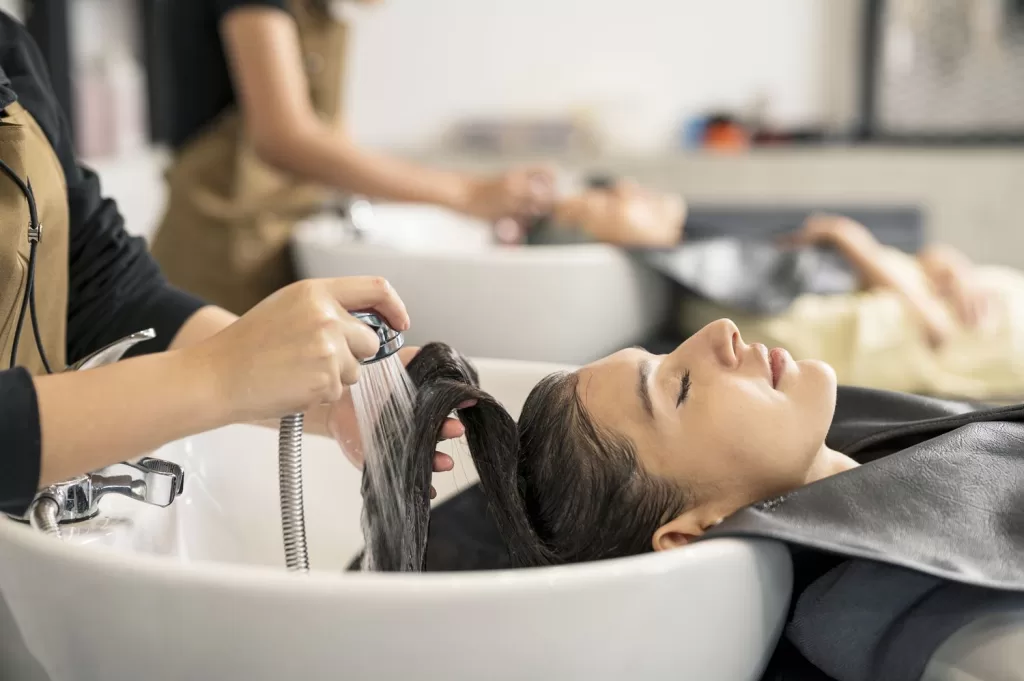Introduction to CRM Technology for Salons
CRM technology, or Customer Relationship Management technology, is a system that helps businesses manage their interactions and relationships with customers. It is a tool that allows businesses to store and analyze customer data, track customer interactions, and streamline their operations. In the salon industry, CRM technology is becoming increasingly important as salons strive to provide personalized and exceptional customer experiences.
Salons rely heavily on building strong relationships with their clients. CRM technology helps salons keep track of customer preferences, appointment history, and other important information. This allows salon staff to provide personalized services and recommendations, leading to increased customer satisfaction and loyalty. CRM technology also helps salons improve their marketing strategies by providing insights into customer behavior and preferences.
Understanding the Benefits of CRM Technology in Salons
1. Improved customer retention: One of the key benefits of CRM technology in salons is improved customer retention. By keeping track of customer preferences and appointment history, salons can provide personalized services and recommendations. This helps build strong relationships with clients and encourages them to return to the salon. CRM technology also allows salons to send targeted promotions and discounts to customers, further incentivizing them to come back.
2. Increased customer satisfaction: CRM technology helps salons provide exceptional customer experiences. By storing customer preferences and appointment history, salon staff can provide personalized services and recommendations. This makes customers feel valued and understood, leading to increased satisfaction. CRM technology also allows salons to send appointment reminders and follow-up messages, ensuring that customers feel taken care of throughout their salon experience.
3. Enhanced marketing strategies: CRM technology provides valuable insights into customer behavior and preferences. Salons can use this information to create targeted marketing campaigns and promotions. For example, if the CRM system shows that a customer prefers a certain type of service, the salon can send them a promotion for that service. This helps salons maximize their marketing efforts and increase their return on investment.
4. Streamlined operations: CRM technology helps salons streamline their operations by automating tasks and processes. For example, CRM systems can automate appointment scheduling and reminders, reducing the need for manual input and reducing the risk of errors. CRM technology can also help salons manage their inventory and supplies, track employee performance and productivity, and generate reports and analytics. This allows salons to operate more efficiently and effectively.
How to Choose the Right CRM System for Your Salon
1. Identifying your salon’s needs: Before choosing a CRM system, it’s important to identify your salon’s specific needs and requirements. Consider what features and functionalities are most important to your salon, such as appointment scheduling, customer data management, marketing automation, or analytics. This will help you narrow down your options and choose a CRM system that aligns with your salon’s goals and objectives.
2. Researching available options: Once you have identified your salon’s needs, research the available CRM options in the market. Look for CRM systems that are specifically designed for the salon industry, as they will have features and functionalities that are tailored to your needs. Read reviews and compare the features, pricing, and customer support of different CRM systems to find the best fit for your salon.
3. Evaluating features and pricing: When evaluating CRM systems, consider the features and functionalities that are most important to your salon. Look for features such as appointment scheduling, customer data management, marketing automation, and analytics. Consider the pricing structure of different CRM systems and determine if it aligns with your budget. Keep in mind that while price is important, it should not be the sole determining factor. Choose a CRM system that offers the features and functionalities that are most important to your salon, even if it means paying a slightly higher price.
4. Seeking recommendations and reviews: Before making a final decision, seek recommendations and read reviews from other salon owners or professionals in the industry. They can provide valuable insights and recommendations based on their own experiences with different CRM systems. Look for reviews that highlight the pros and cons of each CRM system and consider how these align with your salon’s needs and requirements.
Implementing CRM Technology in Your Salon: Tips and Strategies
1. Setting goals and objectives: Before implementing CRM technology in your salon, it’s important to set clear goals and objectives. Determine what you want to achieve with the CRM system, such as improving customer retention, increasing customer satisfaction, or enhancing marketing strategies. This will help guide your implementation process and ensure that you are using the CRM system effectively.
2. Training staff: Implementing CRM technology requires proper training and education for your salon staff. Make sure that your staff understands how to use the CRM system and its features. Provide training sessions and resources to help them familiarize themselves with the system. This will ensure that your staff can effectively use the CRM system to provide personalized services and recommendations to customers.
3. Integrating with existing systems: When implementing CRM technology, consider how it will integrate with your existing systems and processes. For example, if you already have an appointment scheduling system, make sure that the CRM system can integrate with it seamlessly. This will help streamline your operations and avoid any disruptions or duplications of data.
4. Testing and refining: Once you have implemented the CRM system, continuously test and refine your processes to ensure that you are using the system effectively. Monitor customer feedback and satisfaction rates to determine if the CRM system is helping you achieve your goals and objectives. Make adjustments and improvements as needed to optimize your use of the CRM system.
Customizing Your CRM System to Meet Your Salon’s Needs
1. Tailoring features to your salon’s unique requirements: Most CRM systems offer a range of features and functionalities that can be customized to meet your salon’s unique requirements. Take the time to explore and customize these features to align with your salon’s specific needs. For example, you can customize appointment scheduling options, customer data fields, and marketing automation workflows.
2. Personalizing customer interactions: CRM technology allows you to personalize customer interactions and communications. Use the CRM system to store customer preferences and appointment history, and use this information to provide personalized services and recommendations. Send personalized messages and promotions to customers based on their preferences and past interactions with your salon.
3. Creating custom reports and analytics: CRM systems offer robust reporting and analytics capabilities. Use these features to create custom reports and analytics that provide insights into your salon’s performance. For example, you can track customer retention rates, revenue per customer, or the effectiveness of your marketing campaigns. Use this data to make data-driven decisions and improve your salon’s performance.
Streamlining Your Salon’s Operations with CRM Technology
1. Automating appointment scheduling and reminders: CRM technology can automate appointment scheduling and reminders, reducing the need for manual input and reducing the risk of errors. Customers can book appointments online or through a mobile app, and the CRM system will automatically update the salon’s schedule. The system can also send automated reminders to customers, reducing the risk of no-shows.
2. Managing inventory and supplies: CRM systems can help salons manage their inventory and supplies more efficiently. The system can track inventory levels, alerting salon staff when supplies are running low. This helps ensure that the salon always has the necessary products and supplies on hand, reducing the risk of running out of stock.
3. Tracking employee performance and productivity: CRM technology can help salons track employee performance and productivity. The system can track the number of appointments each employee has, the average time it takes to complete a service, and customer feedback and satisfaction ratings. This helps salon owners identify top-performing employees and areas for improvement.
Enhancing Customer Experience with CRM Technology
1. Personalizing communication and marketing efforts: CRM technology allows salons to personalize communication and marketing efforts. Use the CRM system to store customer preferences and appointment history, and use this information to send personalized messages and promotions. For example, you can send a birthday message with a special discount to customers on their birthday.
2. Offering loyalty programs and rewards: CRM systems can help salons implement loyalty programs and rewards. The system can track customer visits and purchases, and automatically assign loyalty points or rewards based on predefined rules. This incentivizes customers to return to the salon and provides them with a sense of value and appreciation.
3. Providing targeted promotions and discounts: CRM technology allows salons to send targeted promotions and discounts to customers. Use the CRM system to segment your customer base based on preferences, purchase history, or other criteria, and send targeted promotions to each segment. This helps maximize the effectiveness of your marketing efforts and increases the likelihood of customer engagement.
Leveraging Data Analytics to Improve Your Salon’s Performance
1. Analyzing customer behavior and preferences: CRM systems offer robust data analytics capabilities. Use these features to analyze customer behavior and preferences. For example, you can track which services are most popular among your customers, which products they prefer, or how often they visit the salon. Use this data to make data-driven decisions and improve your salon’s performance.
2. Identifying trends and patterns: CRM technology can help salons identify trends and patterns in customer behavior. For example, you may notice that certain services are more popular during certain seasons, or that customers who purchase a certain product are more likely to return to the salon. Use this information to adjust your offerings and marketing strategies to better meet customer needs.
3. Making data-driven decisions: CRM systems provide valuable data and insights that can help salon owners make data-driven decisions. Use the data and analytics provided by the CRM system to inform your decision-making process. For example, if the data shows that a certain marketing campaign is not generating the desired results, you can adjust your strategy accordingly.
Integrating CRM Technology with Other Business Tools for Maximum Efficiency
1. Connecting with social media platforms: CRM systems can be integrated with social media platforms, allowing salons to track customer interactions and engagement on social media. This helps salons understand how customers are interacting with their brand and allows them to respond and engage in a timely manner.
2. Integrating with accounting and payroll systems: CRM technology can be integrated with accounting and payroll systems, streamlining financial processes. This allows salons to track customer payments, generate invoices, and manage payroll more efficiently. Integration with accounting and payroll systems also helps ensure that customer data is accurate and up-to-date.
3. Syncing with email marketing software: CRM systems can be synced with email marketing software, allowing salons to send targeted email campaigns to customers. This helps salons maximize the effectiveness of their email marketing efforts and increases the likelihood of customer engagement.
Measuring the ROI of CRM Technology in Your Salon
1. Tracking customer retention and satisfaction rates: One way to measure the ROI of CRM technology in your salon is by tracking customer retention and satisfaction rates. Monitor the number of repeat customers and the percentage of customers who provide positive feedback or ratings. Compare these metrics before and after implementing the CRM system to determine if there has been an improvement.
2. Monitoring revenue and profitability: Another way to measure the ROI of CRM technology is by monitoring revenue and profitability. Track the revenue generated by each customer and compare it to the cost of acquiring and retaining that customer. Determine if the CRM system has helped increase revenue and profitability by improving customer retention and satisfaction.
3. Calculating the cost savings from streamlined operations and reduced marketing expenses: CRM technology can help salons save costs by streamlining operations and reducing marketing expenses. Calculate the cost savings from automating tasks, such as appointment scheduling and reminders, and from sending targeted promotions and discounts. Compare these cost savings to the cost of implementing and maintaining the CRM system to determine if there has been a positive ROI.
If you’re looking for a comprehensive salon CRM software, look no further than SalonSai. With their advanced booking system and AI sales assistant, SalonSai offers a complete solution for managing your salon’s customer relationships. In fact, they even have a related article on their website that discusses the benefits of using a CRM software for salon marketing. Check it out here to learn more about how SalonSai can help you grow your salon business.










